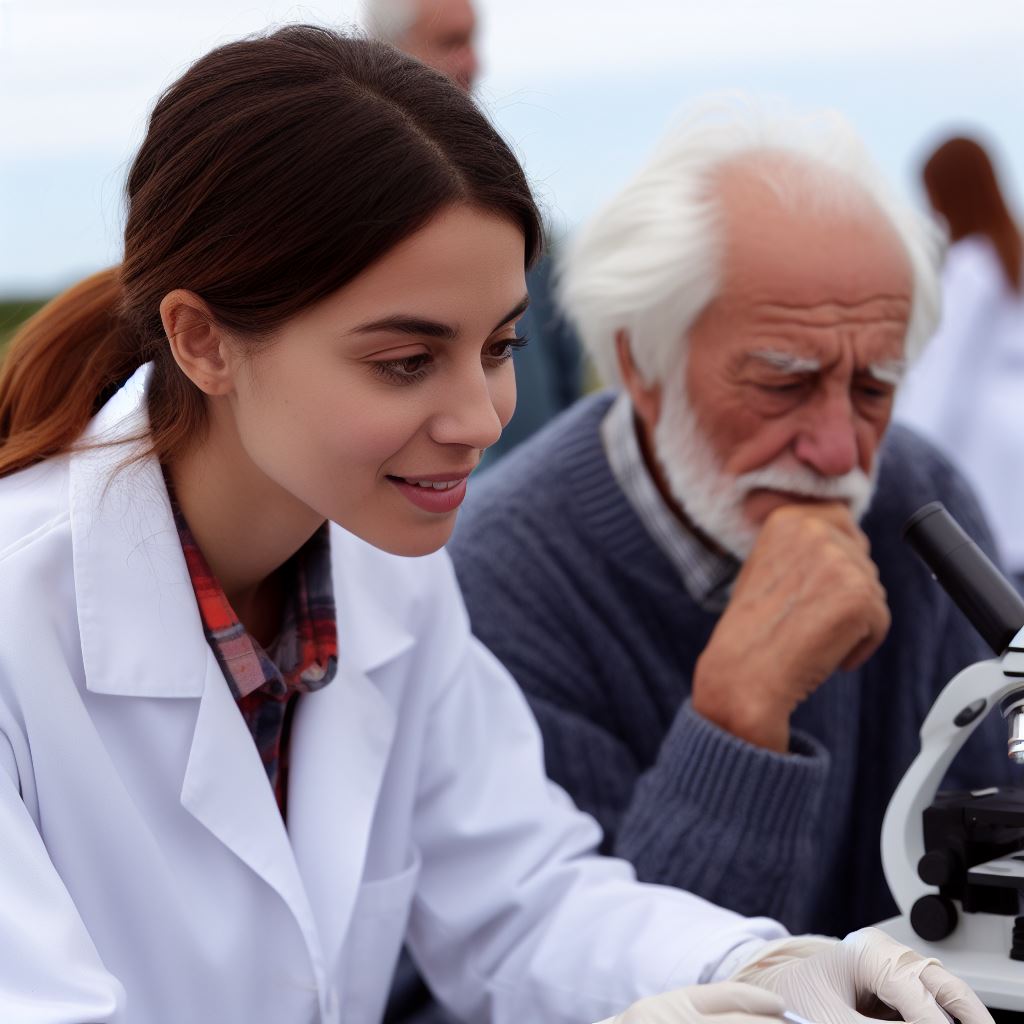Introduction
Gazing into the future, the landscape of research scientist roles in the U.S. by 2030 beckons our attention with promises of innovation, discovery, and transformation.
Recognizing the importance of comprehending the metamorphosis in research scientist positions is vital.
Not only for individuals seeking to navigate their career paths but also for the institutions, industries, and government bodies driving scientific progress in the United States.
The seismic shifts occurring in the scientific domain, driven by advances in technology, evolving societal needs.
And global challenges, necessitate a deep understanding of what the future holds for research scientists.
In this blog section, we will embark on an exploratory journey into the foreseeable roles, expectations, and trends that await research scientists in the coming decade.
The insights gleaned will not only be valuable for aspiring scientists but also for institutions and policymakers striving to align their efforts with the dynamic scientific landscape.
As we delve into this fascinating and ever-evolving topic, we’ll gain a clearer perspective on the future challenges.
Also opportunities that will define the realm of research science in the U.S. by 2030, and how these changes will impact not only the field itself but also society at large.
The current state of research scientist roles in the U.S
Statistics on the number of research scientists
- The number of research scientists in the U.S. has been steadily increasing over the years.
- According to recent data, there are currently over 500,000 research scientists working in the country.
- This number is expected to continue growing as research and development activities expand in various fields.
- The demand for research scientists is driven by advancements in technology, healthcare, and other industries.
- With an increasing emphasis on innovation and scientific progress, the role of research scientists has become crucial.
- Research scientists play a vital role in conducting experiments, analyzing data, and developing new technologies.
- They contribute to various fields such as medicine, engineering, environmental science, and technology.
- Their work often leads to breakthroughs and advancements that benefit society as a whole.
- As the world faces complex challenges, the need for research scientists will only grow.
Major responsibilities and job requirements
- Research scientists are responsible for designing and implementing experiments to gather data.
- They analyze and interpret the data collected to draw meaningful conclusions and make recommendations.
- Strong analytical and problem-solving skills are crucial for research scientists to excel in their roles.
- They must stay updated with the latest developments and research methods in their respective fields.
- Attention to detail and the ability to work independently are also important attributes for research scientists.
- A solid educational background in a relevant field, such as biology, chemistry, or physics, is typically required.
- Research scientists often collaborate with other professionals, such as engineers or medical professionals.
- Effective communication skills are essential for presenting research findings and collaborating with colleagues.
Key industries employing research scientists
- The pharmaceutical and biotechnology industries are major employers of research scientists.
- These industries rely on research scientists to develop new drugs and conduct clinical trials.
- Research scientists also play a significant role in the technology and software development sectors.
- They contribute to advancements in artificial intelligence, cybersecurity, and data analysis.
- The environmental science sector is another key industry where research scientists are employed.
- They study the impact of human activities on the environment and develop sustainable solutions.
- Government agencies and research institutions also employ a large number of research scientists.
- These organizations conduct research on various topics, including healthcare, energy, and defense.
- Overall, research scientists are in high demand across multiple industries, and their roles are critical for innovation and progress.
Basically, the current state of research scientist roles in the U.S. is characterized by a growing number of professionals working in various industries.
Their responsibilities include designing experiments, analyzing data, and making meaningful contributions to their fields.
Research scientists are essential for advancements in technology, healthcare, and environmental science.
The demand for research scientists will continue to increase as the world faces complex challenges and seeks solutions through scientific innovation.
Factors influencing the future forecast of research scientist roles
Technological advancements and innovations
- Rapid advancements in technology are expected to shape the future landscape of research scientist roles.
- Emerging technologies like artificial intelligence and machine learning will transform research processes and methodologies.
- The use of big data analytics and powerful computational tools will revolutionize the way research is conducted.
- Automation and robotics will significantly enhance efficiency and accuracy in data collection and analysis.
- Research scientists will need to adapt and embrace these new technologies to remain competitive in their fields.
Shifting priorities and funding in research fields
- The allocation of funding and research priorities will heavily influence the future demand for research scientists.
- Economic and political factors will play a significant role in determining the focus areas for research funding.
- Government initiatives and policies related to science and technology will shape the direction of research fields.
- Increased emphasis on interdisciplinary research will require collaboration between various scientific disciplines.
- Research scientists will need to stay updated with the evolving trends and align their research interests accordingly.
Demographic changes in the workforce
- Changes in the demographic composition of the workforce will impact the future forecast of research scientist roles.
- The retirement of experienced researchers will create job opportunities for new and early-career scientists.
- The inclusion of underrepresented groups, such as women and minorities, will bring diverse perspectives to research.
- The growth of global collaborations will lead to increased mobility of research scientists across borders.
- Research organizations will need to promote inclusivity and address workforce diversity for better innovation.
In essence, the future forecast of research scientist roles in the U.S. by 2030 will be influenced by various factors.
Technological advancements and innovations will reshape research processes, while shifting priorities and funding will determine the demand for research scientists in specific areas.
Additionally, demographic changes in the workforce will introduce new perspectives and opportunities for diverse individuals.
Research scientists must adapt to these influences and stay abreast of emerging trends to succeed in the changing landscape.
Read: Networking & Growth: Biologist Associations and Conferences in the US
Predicted changes in research scientist roles by 2030
Evolution of research scientist responsibilities
- Research scientists will take on more diverse and complex projects in their respective fields.
- They will be responsible for identifying research gaps and proposing innovative solutions.
- Research scientists will collaborate with industry partners to find practical applications for their research.
- They will also be expected to communicate their findings to both scientific and non-scientific audiences.
- Research scientists will play a crucial role in shaping policies related to their areas of expertise.
Emphasis on interdisciplinary collaboration
- Research scientists will work in teams comprising experts from different disciplines to tackle complex problems.
- They will bring together knowledge from various fields to find holistic solutions.
- Interdisciplinary collaboration will lead to breakthroughs in research and innovation.
- Research scientists will need to develop strong communication and collaboration skills to succeed in this environment.
Integration of artificial intelligence and automation
- Research scientists will utilize AI and automation to carry out routine tasks and data analysis.
- These technologies will enhance productivity and efficiency in research.
- Scientists will need to develop a deep understanding of AI and automation to leverage their potential.
- Robotic systems and advanced algorithms will be utilized in laboratories for experimentation and analysis.
Increased importance of data analysis and interpretation
- Research scientists will be responsible for collecting and analyzing large volumes of data.
- They will apply statistical and computational methods to derive meaningful insights.
- Data interpretation will be crucial in drawing conclusions and making informed decisions.
- Scientists will also need to ensure the accuracy and reliability of the data they work with.
These predicted changes in research scientist roles by 2030 highlight the evolving nature of scientific research.
Research scientists will have broader responsibilities, encompassing interdisciplinary collaboration and the integration of AI and automation.
The ability to analyze and interpret data will become even more important. It is crucial for aspiring research scientists to develop the necessary skills and adapt to these changing trends to thrive in the field.
Read: Innovations & Trends: The Evolving Landscape for US Biologists

Discover More: Navigating Licensing & Certification in Environmental Science
Delve into the Subject: Educational Path: Becoming a Biostatistician
Implications for aspiring research scientists
Necessary skills and qualifications
- Strong analytical and problem-solving skills are essential for aspiring research scientists.
- A solid background in mathematics, statistics, and computer programming is necessary.
- Excellent communication skills, both written and verbal, are important for presenting research findings.
- Attention to detail and the ability to think critically are crucial for conducting rigorous scientific experiments.
- Knowledge of scientific research methodologies and experimental design is necessary for conducting meaningful studies.
- Experience with data analysis software and laboratory equipment is required for conducting successful experiments.
- A graduate degree, preferably a PhD, is often required for higher positions in research science.
Continuous learning and adaptability
- Aspiring research scientists must be willing to continuously learn and stay updated with the latest advancements in their field.
- They should be open to acquiring new skills and knowledge to enhance their research capabilities.
- Adaptability is key in this rapidly evolving field, as new technology and techniques are constantly emerging.
- Flexibility in adapting to changing research priorities and methodologies is crucial for career growth.
Potential growth opportunities and career paths
- The future of research scientist roles in the U.S. by 2030 appears promising, with numerous growth opportunities.
- Advancements in fields like biotechnology, artificial intelligence, and renewable energy will create new research areas.
- Research scientists can specialize in various disciplines such as genetics, nanotechnology, environmental science, and more.
- The demand for research scientists in academia, government agencies, and private industry is expected to increase.
- Career paths can vary from being a principal investigator leading a research team to working in research consultancy or policy development.
- Research scientists can also explore entrepreneurial ventures by translating their research findings into innovative products.
- Collaborative research projects and interdisciplinary work will become more prevalent, offering diverse career opportunities.
Aspiring research scientists should recognize the importance of acquiring the necessary skills and qualifications to succeed in this field.
Continuous learning, adaptability, and a thirst for knowledge are crucial traits for future research scientists.
Additionally, they should embrace the potential growth opportunities and explore different career paths available to them.
With the ever-evolving nature of scientific research, aspiring scientists must remain proactive and seize every opportunity to contribute to advancements and make a meaningful impact on society.
Read: Innovations & Trends: The Evolving Landscape for US Biologists
You Might Also Like: Soil Science and Environmental Policy Making
Challenges and Opportunities for the Research Science Community
Ethical Considerations in Research and Development
- As the role of research scientists evolves, ethical considerations become paramount.
- Scientists must balance innovative research with ethical principles to ensure responsible outcomes.
- Ensuring the welfare of research subjects and respecting privacy rights are significant concerns.
- The development and use of emerging technologies must be guided by ethical frameworks.
- Collaborative efforts are essential to establish ethical guidelines and promote responsible research practices.
Globalization and International Competition
- The research science community faces increasing globalization and intense international competition.
- Researchers must navigate global collaborations and partnerships to enhance scientific progress.
- International competition drives innovation and fosters diversity in research approaches.
- Scientists need to adapt to diverse cultural norms and collaborate across borders.
- Globalization provides opportunities for researchers to access a broader range of resources and expertise.
Potential for Groundbreaking Discoveries and Advancements
- The future holds immense potential for groundbreaking discoveries and advancements in research science.
- Advancements in technology, such as artificial intelligence and genomics, will revolutionize research practices.
- Scientists have the opportunity to develop cutting-edge treatments for diseases and improve overall healthcare.
- The integration of interdisciplinary approaches will lead to transformative breakthroughs.
- Emerging fields, including quantum computing and nanotechnology, hold promise for unprecedented scientific progress.
In the end, the future of research scientist roles in the U.S. by 2030 presents both challenges and opportunities for the scientific community.
Ethical considerations must be at the forefront of research and development efforts to ensure responsible practices.
Globalization and international competition drive innovation and require scientists to collaborate across borders.
However, these factors also provide access to a broader range of resources and expertise.
The potential for groundbreaking discoveries and advancements is immense, with advancements in technology and the integration of interdisciplinary approaches.
As research scientists navigate the future, addressing these challenges while embracing the opportunities will be crucial for continued scientific progress.
Read: Impactful Biologists: Influential Figures in US Biology History
Find Out More: The Role of Chemists in US Environmental and Sustainability Efforts
Conclusion
A recap of main points discussed
Throughout this blog section, we have explored the future forecast of research scientist roles in the U.S. by 2030.
We discussed the rapid technological advancements and the evolving nature of research in various fields.
We highlighted the increasing demand for interdisciplinary collaboration and the importance of developing skills in data analysis, artificial intelligence, and biotechnology.
Additionally, we explored the potential impact of automation on certain aspects of research scientist roles.
Encouragement to stay informed and prepare for the future of research scientist roles in the U.S.
As we move towards 2030, it is crucial for aspiring and current research scientists to stay informed about the latest advancements in their fields.
The ability to adapt to new technologies and embrace interdisciplinary collaborations will be key to success.
It is essential to continuously update skills in data analysis, artificial intelligence, and biotechnology to remain relevant in the ever-changing landscape.
Research scientists should also be prepared for potential changes brought about by automation, finding new ways to add value and leverage their expertise.
Transform Your Career Today
Unlock a personalized career strategy that drives real results. Get tailored advice and a roadmap designed just for you.
Start NowIn summary, the future of research scientist roles in the U.S. is promising but dynamic.
By staying informed, embracing technological advancements, and engaging in continuous learning.
Research scientists can position themselves for success and contribute to groundbreaking discoveries in their respective fields.
[E-Books for Sale]
The Big Book of 500 High-Paying Jobs in America: Unlock Your Earning Potential
$19.99 • 500 High-Paying Jobs • 330 pages
Explore 500 high-paying jobs in America and learn how to boost your career, earn more, and achieve success!
See All 500 High-Paying Jobs of this E-Book
1001 Professions Without a Degree: High-Paying American Jobs You Can Start Now
$19.99 • 1001 Professions Without a Degree • 174 pages
Discover 1001 high-paying jobs without a degree! Unlock career tips, skills, and success strategies for just $19.99!




